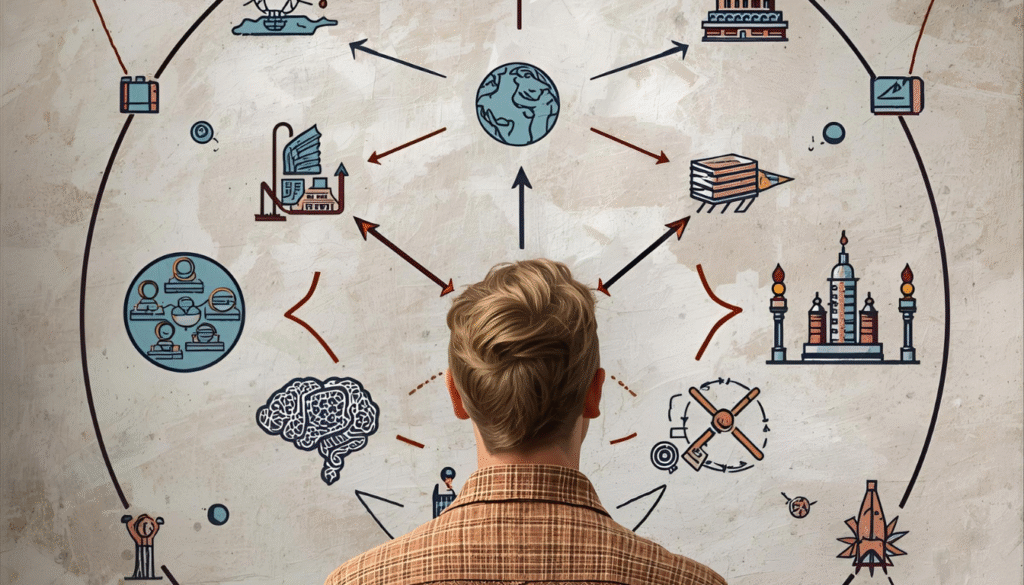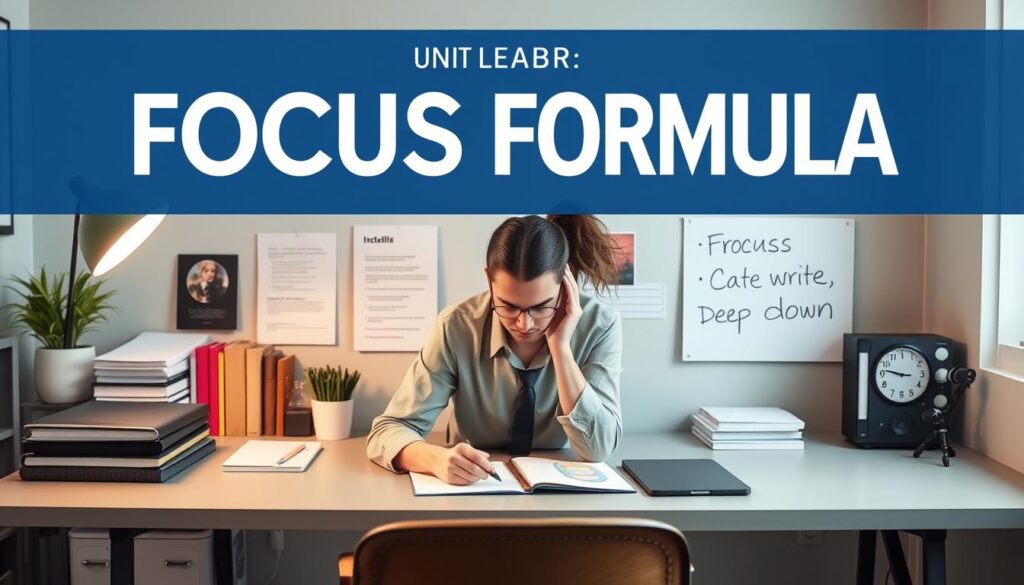Work & Focused Success: The Real Science of Productivity in 2026
Existence in the current world is extremely busy, and people no longer have to succeed merely through hard work or the number of hours put in. Real success is in being smart and focused in working. Based on my personal experience, I want to say that every person can change and improve his or her work life by learning how to be focused, prioritized, and managing the energy.

Awareness is the First Step
Did you ever have a day, when you got through, and you felt like you have worked round the clock, but you have done just about nothing?I have visited it innumerable times.There would be half finished projects, sticky notes and reminders on my desk.The number of emails would be stacked on top of each other, notifications were buzzing every few minutes and I felt very exhausted.One of the painful realizations that I had was that I was busy, not actually productive.The basis on the focused success begins with awareness.It is about noticing your patterns, your energy patterns and the way you react to distractions.You have to know yourself before you can manage your productivity.Practical Tip: Monitor your daily activities in the course of one week.Record the times when you are more energized, distracted and what causes you to procrastinate.You will begin to identify patterns that depict where your attention is bleeding.SEO/GEO Integration: Some entrepreneurs in Germany, France, and Morocco usually spend time charting their energy and productivity trends, and this puts them ahead of competitors in competitive sectors.
Energy Over Hours
The majority of individuals consider that the longer the working hours, the better the results. That’s misleading. I have wasted a night contemplating the more time I put in the more I could get.The truth of the matter is, however, obvious: concentrated energy makes more sense than hours put in.As I started treating time by counting energy instead of hours, the difference was made.I began to recognize my most productive focus intervals which tend to be the first two hours after getting up, and another one in the middle of the afternoon.I defended my time within these hours. No phone. No emails. Just me and the task at hand. Empirical evidence: On a day that I had set aside to write an important report, I had no interruptions and I wrote in two hours what I would have taken all day to write.My thinking was clear, my thoughts were running smoothly and I walked out of my working place feeling successful.SEO Keywords: Work Focused, Peak energy, Focused success, Deep focus, Productivity tips.
The Power of One Big Task
One important lesson that I have learnt is the importance of prioritizing one important task at a time. Being a multitasker may seem productive and it is a myth. Research in Europe and other parts of the world supports the fact that multitasking lowers productivity and causes mental exhaustion. I am asking myself every day: What is the one thing I can do today that will create the most impact? That is the task I put first before everything. In case I manage to do it, the entire day becomes much easier and less stressful. Practical Advice: A basic tool such as a sticky note or a digital planner should be used. Write down the most crucial thing you have to do in the first place and promise yourself not to proceed until you accomplish it. SEO/GEO: In Germany and France, the most successful teams apply the priority-first strategies to organize the workdays so that the most important tasks can be dedicated as much energy and attention as possible.
Creating Your Sacred Focus Blocks
Indeed, deep work is not simply a trendy term; it is essential. With the constant influx of emails, AI alerts, and various applications competing for your attention, maintaining focus becomes increasingly challenging.
Here is my approach: I dedicate 90 minutes exclusively to deep work. During this period, I:
- Silence my phone.
X. Close any tabs that are not in use. - Avoid meetings and refrain from engaging in conversations with anyone.
By implementing this strategy, I enter a productive state. Time flies, and I achieve a significant amount of work.
Would you like to give it a try? Begin with one block of time each day. Protect that time fiercely. Gradually, you can increase the number of blocks as you become more comfortable.
In my experience, the first week of this practice allowed me to accomplish twice as much, lowered my stress levels, and gave me a sense of genuine progress.
Keywords: Deep work, focus, productivity, AI, distractions, work, success.
The Mindset Shift
Finally, the awareness as well as technique is not enough.Developing the attitude of focusing as opposed to being busy is a critical aspect that needs to be brought out.Previously I would reply to all the notifications in the assumption that there was a need to reply instantly.The shift in mentality towards the deliberate focus was transformational.I began to tell myself: I have control over my attention and not the applications and messages.Such an attitude shift helped me to re-appropriate some of the productive time that I had previously been losing on a weekly basis.Action Plan: Think about setting aside one block of time of deep work today.Monitor your mind, discover the distractions, and remember that you are giving yourself a focus instead of it happening.
Mastering Your Energy for Peak Focus
Energy is What Really Matters. Many people are worried about time management. I used to as well. I tried planners, calendars and even some of the more expensive apps that were said to increase what I accomplished. Something struck me then, it is not really the time you have, but the amount of pep. Take it into consideration: you can get a lot more done in a few hours when you are actually feeling it, than when you have to drag out a full eight-hour shift. That is why, great personalities in such countries as Germany, France and Morocco can focus on their energy ups and downs, rather than on the instance of living by the list of their to-do things. What I Did: I made a note of what I did and how energy I felt the entire month. I realized that my strong point was to solve difficult problems during the first part of the day, brainstorming during the second, and finishing simple tasks or simply thinking during the third part of the day. As soon as I began to do the right things at the right time, everything fell just into place.

Identifying Your Peak Energy Zones
Every person has abstract energy patterns. There are those that work best in the morning and those who give their best performance at night. It is imperative to understand that you have a rhythm. Practical Advice: Keep an hourly check on your alertness during a week. Note down the hours you are at your best and when you are tired. These are the best time periods to focus. Guard these hours conscientiously. Personal Experience: The moment I started working only at the times when my concentration is the best, I was able to complete tasks with more efficiency, made better judgments, and felt less fatigued. Even small inconveniences were easier to manage.
Designing Deep Work Sessions
It does not depend on writers or developers, anyone who aims to achieve great results requires intensive focus. Strategy: I have now created deep work sessions of 90 to 120 minutes that I am planning according to my optimal energy. During these periods: Turns off mobile device with notifications off. Pay attention to one main activity. Make sure you are well hydrated and do a quick stretch up first. Pro: Deep work can help an individual become creative, minimize errors, and build momentum. When it comes to the end of each session, there is a sense of achievement that increases motivation further in the rest of the day. Market Intelligence: Experts in the European startups especially in Germany and France note that 2-3 deep work sessions a day would significantly boost creativity and ability to solve problems.
Avoiding Energy Drains
The concept of distractions is not confined to the digital notifications but includes unproductive meetings, multitasking, and minders. Experience: I also learned that consecutive meetings did not help me concentrate. Therefore, I took the following measures: Making mornings without meetings. Setting working hours on emails and messages. Rejection of low-value engagements. The outcomes were immediate. My energy levels continued to be high, productivity increased and stress levels reduced. Tip: Think about energy as a financial asset. Spend it well about the things of importance, and protect it aggressively against any drainers.
Mindful Breaks and Recovery
Work is not the only way to think about energy management, recovery is also important. I have planned pauses at work: 5-minute breathing exercises Short walks outside Light or stretching movement. Experience: Since I incorporated these breaks, I became less distracted, more creative and happier. Even minor breaks are adding up to significant productivity increases. SEO words: Mindful productivity, Energy recovery, Focused success, Work-life balance, European productivity tips.

Practical Tools for Energy Management
The proper utilization of tools may help to sustain energy and focus. Some that work well for me: Distraction-free Intervals: Pomodoro or Forest Focus Timers Apps. Notion or Todoist: Keep a track of tasks according to the energy level. Calendar Blocking: Time blocking (color coded) according to focus zones. Hint: Do not use apps only. It is the attitude and practice that bring the results.
Imagine the mapping of your energy levels within the next three days. Identify your most productive times and schedule a time to do some serious work. Be entirely dedicated to this venture. Summarize what strategies worked at the end of every day and what caused you to be tired. Disclose your findings to your colleagues, because this will help in promoting accountability and individual development. FAQ: Q1: What do I need to know in order to determine my time of maximum energy? A: Keep track of your energy levels every hour throughout a week, keeping an eye on when you feel alert or feel tired. Q2: Can it be said that productivity can be improved with the management of energy? A: Absolutely. When you put your activities in accordance with your energy peaks, this enhances concentration and quality of your work to a great extent. Q3: What to do in case of unavoidable distraction? The first is to minimize interruptions, cluster low-priority work, and make sure that at least one block of time per day is dedicated to deep work.
Navigating Digital Distractions and AI Interruptions
The Modern Productivity Threat
The landscape of focus is very different in 2026. It is no longer social media or emails. Our mind is continuously under the pressure of AI driven notifications, chatbots, and apps that are driven by algorithms. I was used to feeling productive, but I felt destroyed whenever my phone received an artificial intelligence notification and I lost my ground and concentration. Experience: One morning I spent 2 hours on a report. Halfway, I was offered a chatbot suggestion. I thought, “Just a quick check.” After two hours, I found myself distracted and with no energy left and my primary task was not finished. SEO/GEO: Now AI-awareness strategies are actively used by the professionals in Germany, France, and Morocco to protect their attention.
Understanding the “AI Attention Economy”
AI is made to get you hooked. Each warning and recommendation gets you a dopamine rush, leading to minor but significant distractions. They are not annoying and distracting like people, they are on at all times, created specifically to you, and despite everything they even come unnoticed by you. Fast Tip: Use AI alerts just like any other distraction. Ask yourself: * Does I have to go about it at this point? But does it matter whether one answers this? * Can I not wait until I have done what I am doing? What Happened: I started to believe AI alerts in this manner and I got back several hours of valuable work time per week.
Digital Boundaries and AI Discipline
Boundary setting is very essential these days. Here’s what I tried: I turned off AI notifications that were not so essential when I had to pay attention. I applied Do Not Disturb, however, with exceptions in case of urgent things. I also dedicated specific time to apply AI. Quick Tip: Do not jump each time you receive a notification, go through your AI stuff at the end of the day. It will get you tired less and keep you focused.
Creating a Distraction Free Environment
The environment is actually important in terms of maintaining focus. I observed that although my home office was well-organized, there were still some distractions in terms of technology creeping in: * Chat pings from work apps * Background running AI news feeds. * Social media contents appearing. This is what I did, so this is what I eliminated or silenced anything that I did not actually require. I just left the things that I was using at that time. I even cleared my desk of anything irrelevant. In my mind, I was telling myself that it was all right to actually pay attention. The result? I was able to concentrate better after rearranging my work station, was less stressed and work faster.

Embracing “Deep Work 2.0
Alright, here is more human sounding version of that text: The concept of Deep Work by Cal Newport has shifted. It is no longer about avoiding social media, but how to deal with the situation when AI is all around. Here’s what I try to do: Block off pieces of time (90-120 minutes) that you can use truly focused work. AI will only assist, not complicate me. All my AI related do at any given time. Reflect on the way the work was during each working session to determine whether I was productive and focused. This is being done by lots of startups in Europe. Even though they utilize AI extensively, they say that it can make them more creative and do more.
Practical Techniques to Stay in Flow
AI Blackout: No AI twice a day. Work Smart: Do First Things First. Take Breaks: take brief breaks off screens to get your head back in the game. Be Accountable: Share your objectives with a friend or coach. My Results: It is doing this stuff that really made a difference in the way I work. I have become less offensive and much more focused.
Determine what AI item is swallowing your day. Then you can have a blackout hour when you do not use it at all. See how much more you get done! Got questions? Question 1: What do I do to learn what AI notifications to disregard? A: You just need to concentrate on the ones which assist you in your most valuable stuff. Turn off the rest. Q2: What if I work with AI all day? A: Prep your AI work one block at a time, set aside time to do focused work, and inform your team when you should focus. Q3: Is it possible to continue to focus on work despite the presence of AI tools? A: Yep! It can in fact be beneficial when AI is used intentionally, and not continuously.
Crafting a Daily Routine for Work & Focused Success
The Power of Rituals
Productivity is not merely a matter of accomplishing numerous tasks; it involves consistently engaging in the right activities. I experienced a significant breakthrough at my workplace when I began to establish daily rituals.
Currently, my mornings hold a special significance: I dedicate 30 minutes to journaling, 20 minutes to light exercise, and 10 minutes to reviewing my most critical task. This straightforward routine effectively aligns my energy, focus, and mindset for the day ahead.
In countries such as Germany, France, and Morocco, numerous successful entrepreneurs and creatives depend on morning rituals to maintain their productivity and concentration.
Designing Your Ideal Day
To make a routine that works, get what gives you energy, what’s most important, and your surroundings. Here’s how I do it:
Morning (2–3 hours): Do work that needs lots of focus, such as planning, writing, or fixing problems.
Midday (30–60 minutes): Take a walk, meditate, or eat without distractions to get your energy back.
Afternoon (2 hours): Do creative work or work with others.
Evening (30 minutes): Think about your day, write in a journal, and plan for the next day.
Tip: Do your tasks when you have the most energy. Don’t try to be creative when you’re tired.
What happened to me: After a week of doing this, I got stuff done quicker, thought more clearly, and felt less stressed.
Keywords: Daily routine, focus, work, performance,
Eliminating Low Value Activities
A big part of making a routine is cutting out what’s not important. I used to waste time on emails that weren’t a big deal or looking at stuff online that didn’t matter.
Here’s what I did:
- Answer emails all at once at certain times.
- Only use social media for 15 minutes each day.
- Give tasks to other people that I didn’t need to do personally.
It really helped. I suddenly had more free time each week, so I used that time to do important work. I could focus a lot better, and I felt like I was really in charge of my day.

Using Time Blocks Effectively
Time blocking has existed for some time, yet when utilized effectively, it can significantly enhance your productivity.
Suggestion: Schedule tasks on your calendar at designated times. Include additional time for unexpected issues, and take brief breaks to refresh your mind.
My Experience: I experimented with working in 90 minute intervals followed by 15-minute breaks. This approach improved my focus, fostered creativity, and increased my energy levels.
Important Information: Specialists in Europe assert that time blocking is a validated method for increasing productivity and preventing burnout. https://www.youtube.com/watch?v=1vmOa9oRMvA&vl=ar https://deepfocuspro.com/deep/



